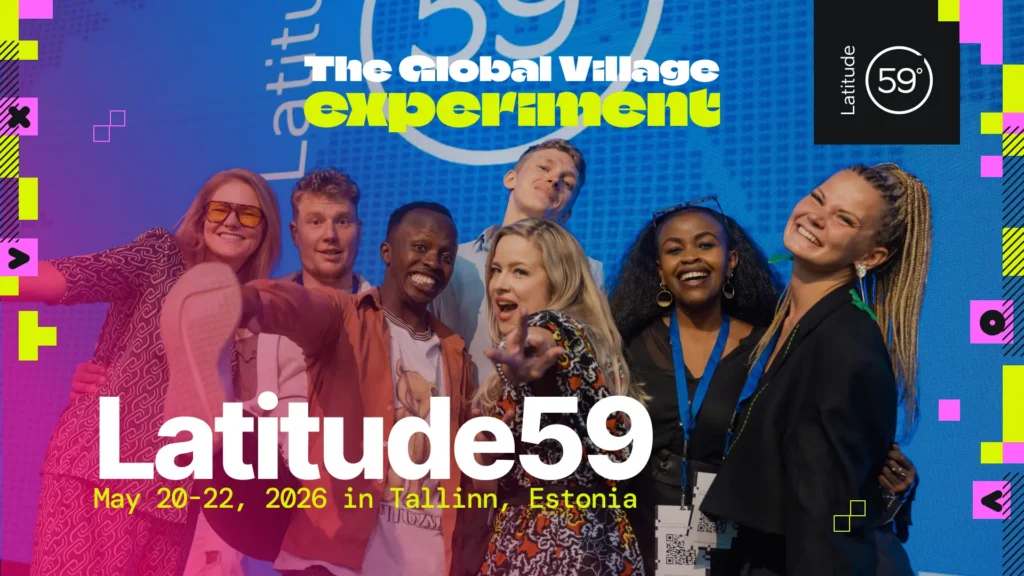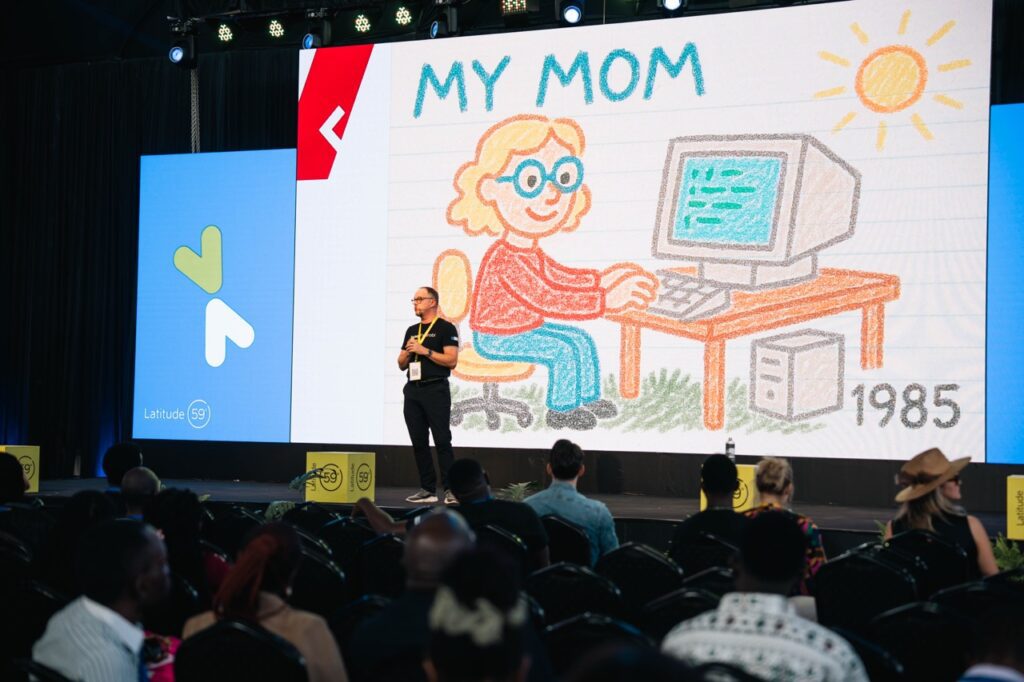Latitude59’s very first satellite event in Asia took off on October 29, 2024—with the usual #Latitudeattitude twist, taking place at a pool-side villa in the middle of wild greenery of Singapore. The bold location was the perfect setting to get to know a whole different side of the city-state of 5.9M people, and connect on a more personal level with the thought-leaders and impact-makers from both ecosystems – Singapore and Estonia.
Latitude59 Singapore Edition 2024—“Latitude59 Global Mixer: Estonian Tech Meets Singapore”—looked for similarities and learning opportunities between the two ecosystems. Speakers from both Estonia and Singapore shared their insights from the rapidly evolving landscapes of both ecosystems, more specifically diving into deep tech, clean tech, the need for collaboration, leveraging the strengths of ecosystems, and the future of digital nations.
A huge thank you to everyone who were with us, who stepped up to say hi, and to all the people who have reached out since – welcome to the #globalvillage! Here’s a recap of our discussions and takeaways in Singapore, including the night of Latitude59xSingapore, as well as the Latitude59’s official panel held at SWITCH 2024 “Latitude59 – From Estonian Startup Ecosystem to Building this Global Village” and the clean tech themed discussion “Estonian Cleantech Innovators: Pioneering and Scaling for a Sustainable Economy”.
Estonia and Singapore: Small Countries with Big Impact
Estonia and Singapore are widely known as appealing destinations for startups and entrepreneurs. Despite (or maybe because of) being small countries, both share a high level of digitalization, a global mindset, an educated workforce and a strong emphasis on innovation.
Kristel Alver, with her extensive experience working in Singapore through Enterprise Estonia, explained at Latitude59’s panel held at SWITCH 2024 that Singapore’s small size, while a challenge, also serves as an advantage. “It’s a very pragmatic, fast-paced environment where connections are easy to make,” she said. This accessibility to local decision-makers helps starting companies scale quickly, allowing them to learn the ropes of the market and adapt faster. Singapore’s lack of natural resources forces businesses to be creative, using intellectual capital as their most valuable resource—something Estonia has in common with Singapore.
Kristel noted that Estonia’s innovative ecosystem thrives on being resourceful and independent. Estonians are known for their hard work, often building businesses from the ground up with little external help. This work ethic, combined with a supportive ecosystem, allows startups in Estonia to scale quickly and effectively. She mentioned that novel foods and the maritime sector are emerging fields in Estonia, which present exciting opportunities for investment and collaboration. Additionally, Estonia’s widely-recognized expertise in cybersecurity is something to keep an eye on, and more crucial than ever9

Listing the strengths of the Singapore tech ecosystem, one has to admire the number of deep tech innovators— roughly 1,300 deep tech startups have sprouted from the market, including EdgeConneX, BandLab, Trax, Terra, and MathWallet. Estonia has declared its aspiration to have 500 deep tech companies by 2030. It’s good to have rolemodels, especially when fostering ambitious goals!
Tarvo Õng, the CEO of Fusebox, agreed that the ecosystems of Estonia and Singapore are not that different in general. Both countries are highly digitalized, and both face the challenge (and opportunity!) of thinking beyond borders in a globalized world. However, he did note one clear difference: the timezone—unlike Estonia’s close proximity to European markets, Singapore’s time zone adds a bit of a challenge for global coordination and doing business.
Mariana Hagström, CEO of Avokaado, also touched on the similarities between the two countries, noting that Singapore is always looking for faster digital solutions—a need that Estonian companies are well-positioned to fulfill. “We’re happy to bring our expertise and solutions to Singapore,” she said, emphasizing the importance of collaboration between both nations.
Jari Talvinen, Managing Director at Karuna Capital has spent the last 15 years in Asia, shared how over the decades, Estonia has become a launchpad for successful global startups, like Bolt and Veriff—two of the country’s unicorns, where he also holds a stake as an investor. He emphasized the importance of passion and dedication when choosing which startups to invest in, but also noted that the Estonian ecosystem is small, and finding the right market and team is crucial. The opportunities are vast, especially in deep tech and AI, but the competition is fierce—even more so in Singapore, where investors have more resources to tap into. In the end, a great startup can sprout from anywhere, but having the ecocsytem’s support and backup plays a huge role.
The Importance of Connections and Ecosystem’s Growth Beyond Borders
Latitude59 is on a mission to connect communities and help startup ecosystems trhive. The satellite event in Singapore was a huge milestone, strengthening the collaboration between Estonia and countries like Singapore. We believe that being active in the world and building bridges makes Estonia bigger—a crucial step for a nation of 1.3M people.
It wasn’t Latitude59’s first visit to Singapore. Liisi Org, the CEO of Latitude59, was part of the Estonian delegation visiting SWITCH in 2023, representing the Estonian ecosystem as a keynote speaker and inviting attendees to Latitude59 in Tallinn. Kristel Alver noted how their Estonian delegation’s visit to Latitude59 in Tallinn last year led to new startups and ventures being born from the connections made. She praised Latitude59 for creating a platform that bridges the gap between startups in both regions. “For Estonia, Latitude59 is a great milestone. It’s about taking baby steps while envisioning big things—creating partnerships, forming collaborations, and eventually making a significant impact,” she explained.
Mariana Hagström also emphasized how important it is for Estonian companies to be seen and recognized internationally. The Latitude59 presence in Singapore is a critical part of growing the visibility of Estonian startups and attracting attention to Estonia’s vibrant startup ecosystem. “Every conference and connection around the world helps us make Estonia’s presence better known,” she said. Latitude59’s presence in Singapore contributes to ensuring that Estonia’s innovations, especially in fields like deep tech, clean tech and cybertech have the global reach they deserve.
Tarvo shared his perspective, referring to conferences like Latitude59 as “lottery tickets”—opportunities that provide access to networks and investments. “If you don’t buy a ticket, you can’t win,” he quipped. He went on to explain that being part of these events forces entrepreneurs to step out of their comfort zones and connect with people who can help them grow and scale their businesses. These events are not just about attending—they’re about actively engaging and forging relationships that can help businesses thrive in international markets and thus bring about a real change in the world! The technology sector has a huge potential to change the world for the better, but it can’t grow in a vacuum.
Energy, Clean Tech and Deep Tech: Collaborating for a Better Future
A particularly exciting discussion revolved around the fast-evolving energy sector and clean tech in general. Tarvo, whose company Fusebox is focused on transforming the energy sector, explained that the energy transition is already underway. He highlighted the idea of energy consumption being increasingly rewarded, where users can not only save money but potentially earn money as well by participating in energy-saving programs. We need to change our mindset as consumers.
“As the energy sector goes through massive change, it’s essential for companies to manage those changes effectively,” Tarvo said. He noted that energy companies are constantly looking for innovative solutions that help them perform better and scale. This creates immense opportunities for collaboration between Estonian and Singaporean clean tech companies.
Mariana also touched on the clean tech opportunities in both countries, particularly digital solutions in energy management. She emphasized that her company, Avokaado, is currently exploring how to help businesses in Singapore optimize their operations with innovative digital tools. As deep tech continues to grow in importance, both Singapore and Estonia are becoming key players in the global clean tech revolution.

Kädi Ristkok, CEO of Cleantech Estonia, highlighted the explosive growth of clean tech in Estonia. She noted that the country is seeing a surge of new clean tech startups and scale-ups that are not only pushing innovation but also helping others grow at a faster pace and changing how we view and piroritize sustainability. However, she stressed that collaboration is key—Estonia needs to foster more partnerships to build a sustainable clean tech ecosystem. As Estonia is one of the most digitally advanced nations, deep tech is a promising area, succesfully fusing with other vectors, but it needs local market knowledge to scale effectively.
While Estonia may be a global leader in digital transformation, there are still lessons to be learned from Singapore, particularly when it comes to speed of decision-making and pragmatism. As Kädi observed, Singapore’s fast-paced, pragmatic approach to innovation and policy is something Estonia can adopt more broadly. In her view, Estonia’s clean tech sector has the potential to grow even faster, but it needs to be more aggressive in grabbing opportunities and making swift decisions.
Clara Chen, founder of the Singapore Deep Tech Alliance, emphasized that while deep tech is often seen as a broad field, it is capable of solving complex problems such as mental health and population well-being. She pointed out that deep tech is most effective when paired with local expertise, market support, and infrastructure. While Singapore is making strides in digitalization, it still has a lot to learn from Estonia, which is significantly more advanced in terms of digital government services, including e-residency and e-governance systems.
The Role of Governments and Digital Nations
A significant topic that emerged during the discussions was the role of governments in shaping the future of technology. Vikram, the founder of Draper House, also underscored how important digitalization is to modern economies. Drawing inspiration from Estonia’s e-residency program, he presented his idea of creating a cloud-based country that has no physical borders—what he referred to as a digital nation. Although it’s an experiment, he believes it could open up new opportunities for providing essential services like healthcare, insurance, and education to billions of people at a lower cost. This speaks to the larger trend where digital services could replace traditional systems, pushing governments to rethink their roles.
Vikram raised an interesting philosophical question about the future of sovereign nations. As technology continues to evolve, borders and traditional concepts of governance may become less relevant. He speculated that digital nations—like Estonia’s e-residency model—could one day provide the infrastructure for people around the world to access essential services without the need for physical borders. In his vision, these cloud-based countries could unite people globally, solving challenges like healthcare, insurance, and education in a radically efficient way.
The “global village” concept was also championed by Liisi from Latitude59, who pointed out that Estonia, despite its small size, is already functioning as a global village. In recent years, uniting tech and startup communities around the world has become one of the main missions of Latitude59. Liisi shared that the tagline #globalvillage (or ilmaküla, in Estonian) sprouted from Rainer Sternfeld’s podcast “Global Estonians”, where he interviewed global Estonians—those who have lived in different places—and brought them together through shared visions of innovation.
Looking Ahead: The Power of Collaboration
Both Estonia and Singapore are forward-thinking nations, dedicated to pushing the boundaries of technology and innovation, creating a space where startups from everywhere can flourish. As the conversation concluded, the panelists agreed that collaboration is key to achieving global impact. Whether it’s in clean tech, energy, or deep tech, working together and sharing knowledge is the path forward. Kristel summed it up perfectly: “We need to keep collaborating, stay focused, and create meaningful connections. This is just the beginning.”
Our team at Latitude59 is immensly grateful for the chance to collaborate with SWITCH this year and land in Asia with an official side event of Singapore’s leading startup event. The Latitude59 Global Mixer: Estonian Tech Meets Singapore showcased the power of international collaboration and the potential for startups from both countries to make a lasting impact on the world. As Estonian companies continue to expand into the Singaporean market—and vice versa—these connections will only grow stronger, helping to build a more innovative, sustainable, and globally connected future.
The Latitude59 Kenya Edition 2024, taking place on November 29, was organized in collaboration with the Estonian Embassy in Singapore, Estonian Business and Innovation Agency (EIS), the SWITCH conference and Latitude59. The event was partly funded by European Union – Next Generation EU.
A very special thank you to all the attendees, and most of all, the panelists: Clara Chen (Founding Partner of Singapore Deep-Tech Alliance (SDTA)), Kädi Ristkok (CEO of Estonian Cleantech Association), Jari Talvinen (Managing Director at Karuna Capital), Vikram Bharati (Founder of Draper Startup House), and our very own Liisi Org for leading the panel about connecting the two ecosystems of Singapore and Estonia; as well as the Estonian Ambassador Priit Turk (Ambassador of Estonia to Singapore) for the opening words and the warm welcome.
Since events like these are all about helping startups succeed and make an impact in the world, we’re very proud of the official delegation of Estonian founders and startups present: Erlend Sild (BugBox), Henrik Hal (H2Electro), Mariana Hagström (Avokaado), Heikki Haldre (Miros), Art Koval (Wisercat) and others. PS. Investors, take note – many of them are ready to raise a round!
Our official panel at SWITCH 2024 on November 30, “Latitude59 – From Estonian Startup Ecosystem to Building this Global Village”, included Kristel Alver (Chief Representative Officer at Enterprise Estonia Singapore), Mariana Hagström (CEO of Avokaado), Tarvo Õng (CEO of Fusebox) – thank you for sharing your thoughts and making Estonia bigger in the world!
As a final note, our #Latitude59xSingapore team – including Kadri Barclay (Head of Global Marketing at Latitude59), Enriko Pedaksalu (Creative Director at Latitude59) and Liisi Org (CEO at Latitude59) – were blown away by the warm welcome of the Singapour startup community!
Until next time – we’ll definitely be back in Asia!

















